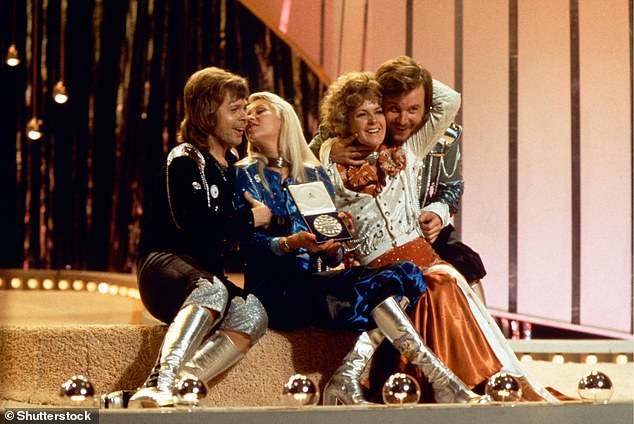The Book Of ABBA by Jan Gradvall (Faber & Faber £20, 336pp)
When a fresh-faced quartet of Swedish singers decided to rebrand themselves, they were dismayed to find that the name they had chosen already belonged to a company that processed and packaged herring.
The fish factory boss kindly agreed to share the name with them, as long as they promised not to tarnish the reputation of his herring business with any wild behaviour.
The group kept their promise. Despite their tangled romantic lives, there was never a hint of scandal about ABBA, the wholesome supergroup who dominated the pop charts from the mid-1970s until the early 1980s.
Bjorn Ulvaeus (the baby-faced one), Benny Andersson (bearded), Agnetha Faltskog (blonde) and Anni-Frid Lyngstad (brunette) first performed together in the late 1960s. They had some chart success in Sweden but their big break didn’t come until the 1974 Eurovision Song Contest.
ABBA thought they had the perfect song, a wistful number called Hasta Manana, which was more in the mould of previous winners. At the last minute they had a change of heart and went with the irresistible Waterloo.
When Agnetha, in blue satin, and Frida, in a maxi-skirt, bounded on stage, they created a sensation. They had spent hours gluing tiny stars on to their faces; Benny and Bjorn were also dressed up to the nines in britches and silver boots. ABBA’s clothes were ‘louder and more sparkly than anyone had ever dared attempt in the history of the competition’, author Jan Gradvall writes.
Despite scoring nul points from the British jury, ABBA won. Although they were the first Swedish entry ever to win Eurovision, the reaction back in their homeland was less than ecstatic. Why, one interviewer asked them accusingly, had they performed a song celebrating a battle in which 40,000 people had been killed?
Before long the world was swept by Abbamania, as we all sang along to hits such as Mamma Mia, SOS, Fernando and Voulez-Vous. Bjorn and Benny had the magical knack of writing an apparently endless stream of catchy songs, even if their lyrics were often clunky.


Mamma Mia: For a time ABBA was made up of two couples as Bjorn and Agnetha, and Benny and Anni-Frid were in relationships


Icons: ABBA were a global phenomenon between 1972 and 1982 , releasing 8 albums
Bjorn, a keen runner, came up with the idea for Take A Chance On Me by noticing the ‘t-k-ch’ sound his feet made as he pounded the pavement. Benny wrote Thank You For The Music in half an hour when he was at a party and spotted a piano in the corner of the room.
Gradvall puts forward an interesting theory that part of ABBA’s appeal was the broad strain of sadness that ran through their music. ‘Even the happier songs are melancholy at their core,’ Benny has said. Both he and Bjorn have admitted to struggling with alcohol addiction and have been sober since the 1990s.
ABBA never officially broke up but in 1982 they took a break from recording together, a break that ended up lasting almost 40 years. By then Bjorn and Agnetha, as well as Benny and Frida, had divorced. Songs such as Knowing Me, Knowing You and The Winner Takes It All reflected the pain of their fractured relationships.
In their heyday, the band were dismissed as purveyors of cheesy pop. If you wanted to be thought cool in the 1970s and 1980s you would never let on that you owned a well-worn ABBA cassette. Curiously, one of the few people who admitted to adoring them was the notorious punk rocker Sid Vicious, who used to play ABBA’s Greatest Hits on a loop.
In 1992, the Irish band U2 played a concert in Stockholm. As lead singer Bono began to sing Dancing Queen, the spotlight picked out Bjorn and Benny playing on stage with the band. The two men later said that they were sure U2 had invited them there simply to make fun of them. Instead, as the crowd joyfully sang along, Bono knelt down in unironic homage to Bjorn and Benny and their music. U2 had brought ABBA in from the cold.
ABBA have sold more than 150million records worldwide, and each new generation keeps discovering their music. The musical Mamma Mia!, which has been playing non-stop in the West End since 1999, was made into a hit film. And Abba Voyage, which recreates the
experience of being at a 1979 ABBA concert using avatars of the fab foursome, has been packing in the crowds at a specially built venue in East London since 2022.

